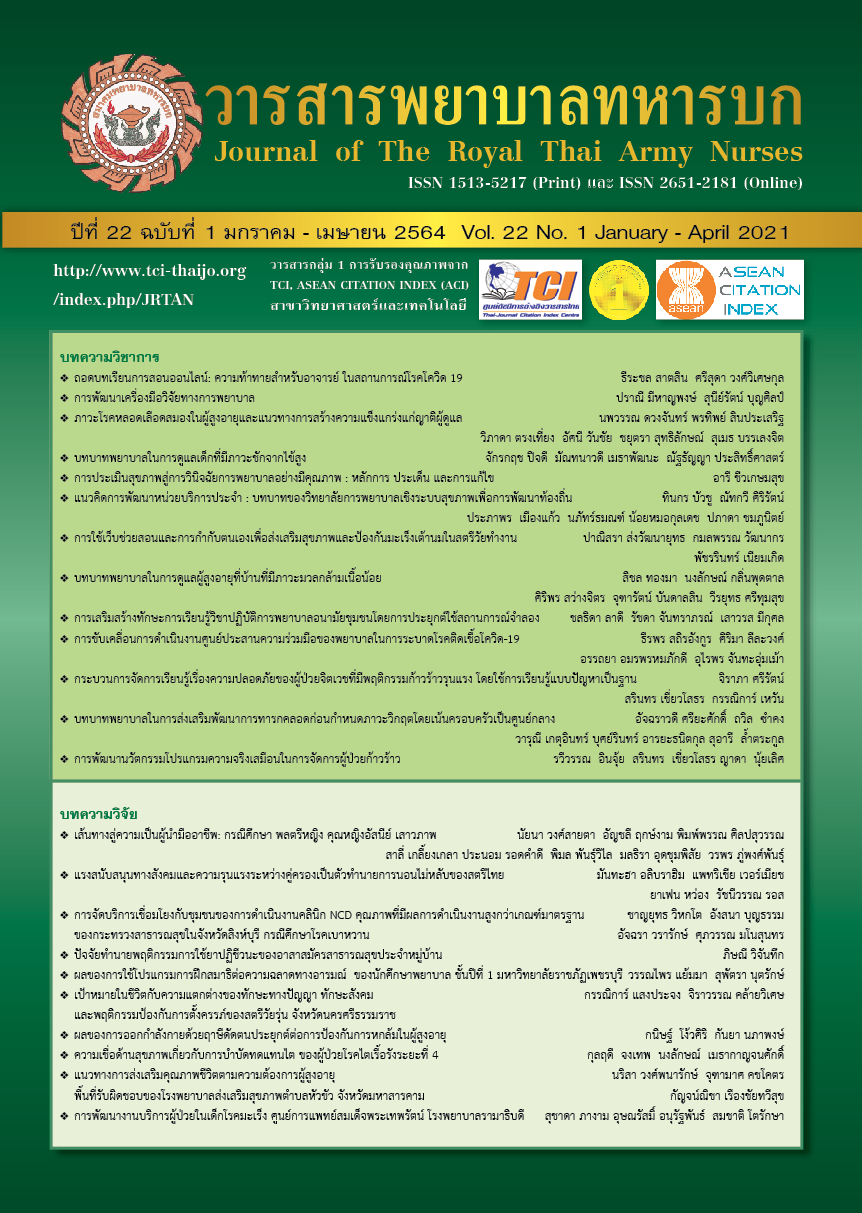Factors Influencing Competencies of Nursing Anesthetists at Hospitals under the Ministry of Public Health in Health Region 9 (Nakhon Chai Burin)
Keywords:
Competencies, Nurse anesthetist, Motivation to work, Working environmentAbstract
The purposes of this descriptive research were: 1) to study motivation to work, working environment, and competencies of nursing anesthetists at hospitals under the Ministry of Public Health, Health Region 9 Nakhon Chai Burin and 2) to examine the predictor variables: age, income, motivation to work, and working environment on the competencies of nursing anesthetists. The sample included 94 nursing anesthetists in a hospital under the Ministry of Public Health. The research tools composed of questionnaires which composed of 4 sections: 1) general information, 2) motivation to work, 3) working environment, and 4) competencies of nurse anesthetists. The second to the fourth sections of the questionnaires which were validated by 5 experts obtained content validity indexes of 0.98, 0.99, and 0.96 respectively and Cronbach’s alpha reliability coefficients were 0.99, 0.873, and 0.98 respectively. Data were analyzed by descriptive statistics and stepwise multiple regression analysis.
The major findings were as follows. 1) Nursing anesthetists rated their overall motivation to work and competencies of nursing anesthetists at the high levels; while, they rated their overall working environment at the moderate level. Lastly, 2) working environment, age, and maintenance factors could predict the competencies of nurse anesthetists, and all of them accounted for 30.40 percent at the significant level of .05
Downloads
References
Lysaght, R.et.al. An exploration of social support as a factoring the return-to-work process. Work.2001: 30(3), 255-266. Measuring workplace social support for work with disability. Journal of Occupation Rehabilitation ; 2012 : 22(3), 376-386.
Cheevakasemsook A. Rattanaraj P. Factors Affecting Positive Practice Environment of Registered Nurses. Journal of The Royal Thai Army Nurses. 2017; 18(2) : 74-81.(in Thai)
Wivatvanit S., Saardwai P. The Development Of Nurse Anesthetists’ Competency Assessment Scale. Journal of The Royal Thai Army Nurses. 2019 ; 20(2) : 123-130.(in Thai)
Saenasan P. Nursing management for safety. Bangkok:Printing happiness ; 2015.
Suksa K. The study of the incidence and risk of anesthesia complications In Srinagarind Hospital between 2004-2012. Srinakarin Vejsarn. 2011 : 26(3) : 183-190 .(in Thai)
Plunkett, W. R. Supervision: Diversity and Teams in the Workplace. (8th ed). New Jersey : Prentice – Hill ; 1995
Nursing Office Ministry of Public Health. Nursing standards in hospitals. (2nd update). 2nd edition. Nonthaburi: Veterans Organization ; 2015 : 12 (1) : 1-5.(in Thai)
Pachusilpa G. Worrachitti N. Predicting Factors Of Professional Nurses’ Retention. Journal of The Royal Thai Army Nurses. 2017; 18 (Supplement): 112-120.(in Thai)
Herzberg F. “One more time: How do you motivate employees?” Harvard Business Review; 1997, 65(5), 109-120.
The motivation to work. New Brunswick (U.S.A.) and London (U.K.) Tranaction Publishers ; 2000
The managerial choice, to be efficient and to be human. Homewood IL : Dow Jone Irwin ; 1976
One more time: How do you motivate employees. Havard business school Corporation ; 2003
Downloads
Published
How to Cite
Issue
Section
License
บทความหรือข้อคิดเห็นใดใดที่ปรากฏในวารสารพยาบาลทหารบกเป็นวรรณกรรมของผู้เขียน ซึ่งบรรณาธิการหรือสมาคมพยาบาลทหารบก ไม่จำเป็นต้องเห็นด้วย
บทความที่ได้รับการตีพิมพ์เป็นลิขสิทธิ์ของวารสารพยาบาลทหารบก
The ideas and opinions expressed in the Journal of The Royal Thai Army Nurses are those of the authors and not necessarily those
of the editor or Royal Thai Army Nurses Association.






